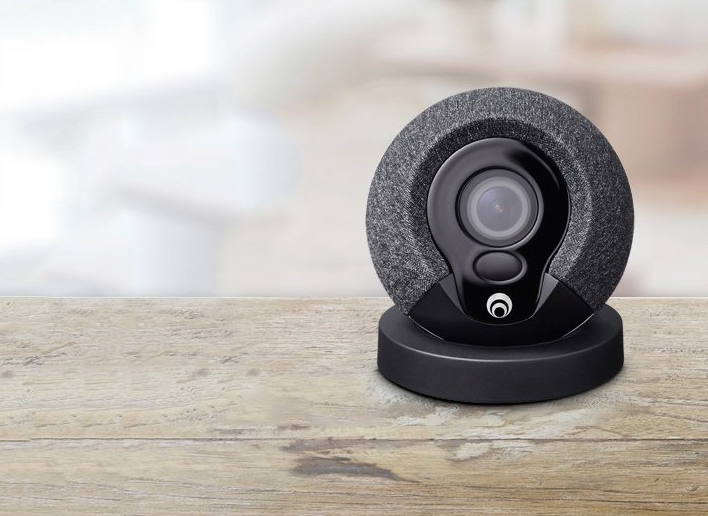What does your business do?
Cocoon is the world’s smartest home security device. Using sound-based AI, our unique Subsound technology means one Cocoon, the size of a cricket ball, is powerful enough to secure every room in your house.
The device listens to your home’s sound patterns to build a picture of your everyday – learning to decipher the worrying from the mundane, and alerting you to anything unusual through the app. This means Cocoon can tell the difference between your cat misbehaving, your kids getting home from school, a pipe bursting, and a break-in.
Where did the idea for your business come from?
The idea for Cocoon was actually born over a drink in Leeds. At the time, four out of five founders were moving house and having issues with home security. Dan Conlon (co-founder and head of product) had recently been unable to stop his alarm from sounding, which was understandably upsetting his family and neighbours. Exasperated, he eventually resorted to removing the alarm system from his wall with a hammer!
The more we shared stories, the more it became clear that current security solutions were ineffective, difficult to install and manage, prone to false alarms, and expensive. We thought we could do better so got to work with one key goal – to have everything in one device so there would be no need for sensors.
The real ‘ah-ha’ moment came when we realised we could do this using low-level sound waves. Humans can’t hear infrasound, but it’s caused by movement and travels through the walls and floors of your your home, so by detecting it Cocoon could detect even very subtle activity, like a hand against the glass of your window. Combine this with machine learning to decipher between day-to-day living and unusual activity, improve accuracy and minimise false alarms, and our unique Subsound technology was born.
How did you know there was a market for it?
Our own experiences implied that there was a problem in the home security market, and that it hadn’t seen real innovation for decades. The success of our crowdfunding campaign (reaching our total $100,000 target in the first three days) proved that others thought so too.
Before Cocoon if you were looking for home security there were two choices: relatively affordable but ineffective camera based solutions, or expensive, traditional home security systems. The IP cameras are reliant on ‘line of sight’, so you need multiple devices for complete home security. Most send constant streams of data captured in your home to a third party, so while they offer some protection for your home, they may not truly protect your privacy.
Furthermore, traditional alarm systems are often out of the homeowner’s control, require professional installation, sensors throughout the home, and bring frequent false alarms. Alarms are so often false that they’re frequently ignored (statistics show that nearly 90% of people ignore alarms).
By contrast, Cocoon offers one simple, elegant device that can protect a whole home, whether that’s a city apartment, a three story townhouse or a sprawling suburban bungalow.
How did you raise funding, and why?
We started by proving demand with an Indiegogo campaign. Crowdfunding enabled us to get real feedback and iterate our offering accordingly. Our project was so popular it overfunded by more than 200 per cent.
Since then we’ve secured $1.3 million (£900,000) from Breed Reply Investments and closed a $3 million (£2.08 million) seed investment from Aviva Ventures and Breed Reply Investments in December 2015. We’re currently raising our Series A.
What was your first big milestone and when did you cross it?
Reaching our crowd funding target was easily the first biggest milestone we’ve achieved as a company. We worked tremendously hard on perfecting the product and establishing an incredible community of backers who really believe in our vision. This paved the way for everything we’ve achieved since.
The next real milestone was being able to give Cocoons to our backers, and hearing their feedback, at our launch party.
Describe your business model in brief
We began selling Cocoon on our own website (cocoon.life) but are now live on Amazon UK and US too.
We have partnered with Zurich to reward those who take a smarter approach to protecting their home. Customers get discounts on both their home insurance and their Cocoon through brokers across the UK. Working together, Zurich and Cocoon offer the kind of assurance and protection needed for our increasingly connected homes, putting homeowners back in control.
What advice would you give to other entrepreneurs?
Don’t be afraid to make mistakes. Taking lots of small risks to learn so if an experiment fails then its risk is minimised.
Where do you want to be in five years’ time?
Serving customers around the world, giving them a real sense of feeling secure.
If you weren’t an entrepreneur, you would be…
I’d be a meditation teacher working with young people to help them understand their minds better.
What is your philosophy on business or life, in a nutshell?
Ego is the enemy. If you can see beyond yourself, empathise with others and have compassion for your fellow men and women, then you’ll do the right thing for your family, employees and customers.






